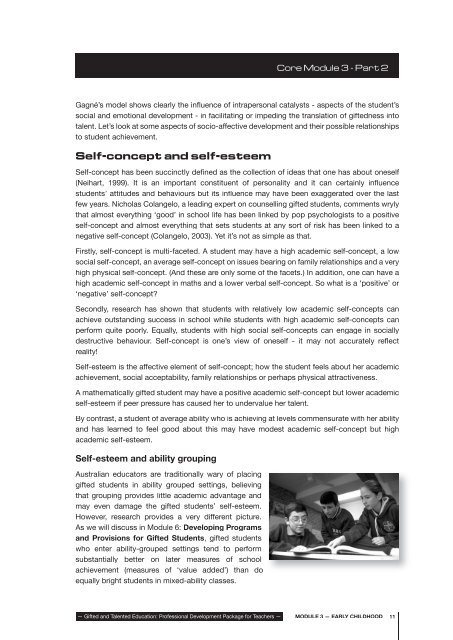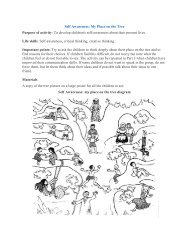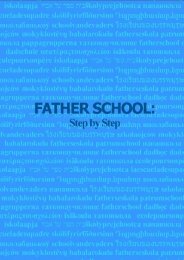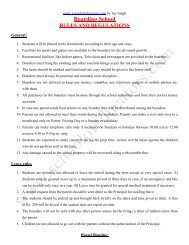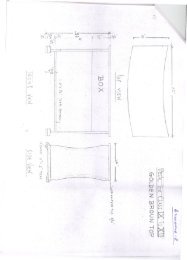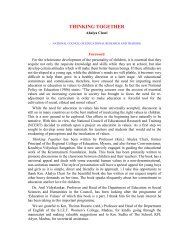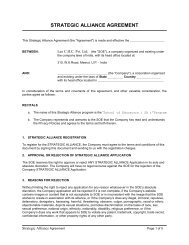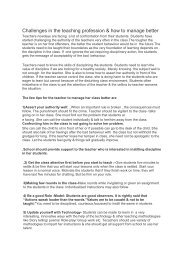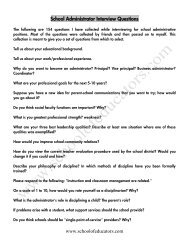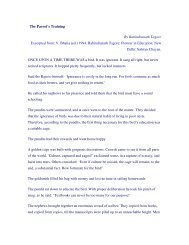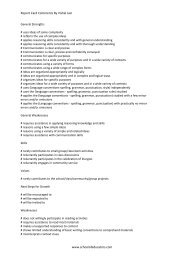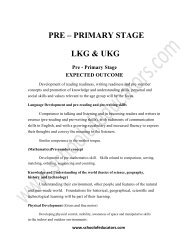Module 3 - School of Educators
Module 3 - School of Educators
Module 3 - School of Educators
- No tags were found...
Create successful ePaper yourself
Turn your PDF publications into a flip-book with our unique Google optimized e-Paper software.
Core <strong>Module</strong> 3 - Part 2Gagné’s model shows clearly the influence <strong>of</strong> intrapersonal catalysts - aspects <strong>of</strong> the student’ssocial and emotional development - in facilitating or impeding the translation <strong>of</strong> giftedness intotalent. Let’s look at some aspects <strong>of</strong> socio-affective development and their possible relationshipsto student achievement.Self-concept and self-esteemSelf-concept has been succinctly defined as the collection <strong>of</strong> ideas that one has about oneself(Neihart, 1999). It is an important constituent <strong>of</strong> personality and it can certainly influencestudents’ attitudes and behaviours but its influence may have been exaggerated over the lastfew years. Nicholas Colangelo, a leading expert on counselling gifted students, comments wrylythat almost everything ‘good’ in school life has been linked by pop psychologists to a positiveself-concept and almost everything that sets students at any sort <strong>of</strong> risk has been linked to anegative self-concept (Colangelo, 2003). Yet it’s not as simple as that.Firstly, self-concept is multi-faceted. A student may have a high academic self-concept, a lowsocial self-concept, an average self-concept on issues bearing on family relationships and a veryhigh physical self-concept. (And these are only some <strong>of</strong> the facets.) In addition, one can have ahigh academic self-concept in maths and a lower verbal self-concept. So what is a ‘positive’ or‘negative’ self-concept?Secondly, research has shown that students with relatively low academic self-concepts canachieve outstanding success in school while students with high academic self-concepts canperform quite poorly. Equally, students with high social self-concepts can engage in sociallydestructive behaviour. Self-concept is one’s view <strong>of</strong> oneself - it may not accurately reflectreality!Self-esteem is the affective element <strong>of</strong> self-concept; how the student feels about her academicachievement, social acceptability, family relationships or perhaps physical attractiveness.A mathematically gifted student may have a positive academic self-concept but lower academicself-esteem if peer pressure has caused her to undervalue her talent.By contrast, a student <strong>of</strong> average ability who is achieving at levels commensurate with her abilityand has learned to feel good about this may have modest academic self-concept but highacademic self-esteem.Self-esteem and ability groupingAustralian educators are traditionally wary <strong>of</strong> placinggifted students in ability grouped settings, believingthat grouping provides little academic advantage andmay even damage the gifted students’ self-esteem.However, research provides a very different picture.As we will discuss in <strong>Module</strong> 6: Developing Programsand Provisions for Gifted Students, gifted studentswho enter ability-grouped settings tend to performsubstantially better on later measures <strong>of</strong> schoolachievement (measures <strong>of</strong> ‘value added’) than doequally bright students in mixed-ability classes.— Gifted and Talented Education: Pr<strong>of</strong>essional Development Package for Teachers — MODULE 3 — EARLY CHILDHOOD11


